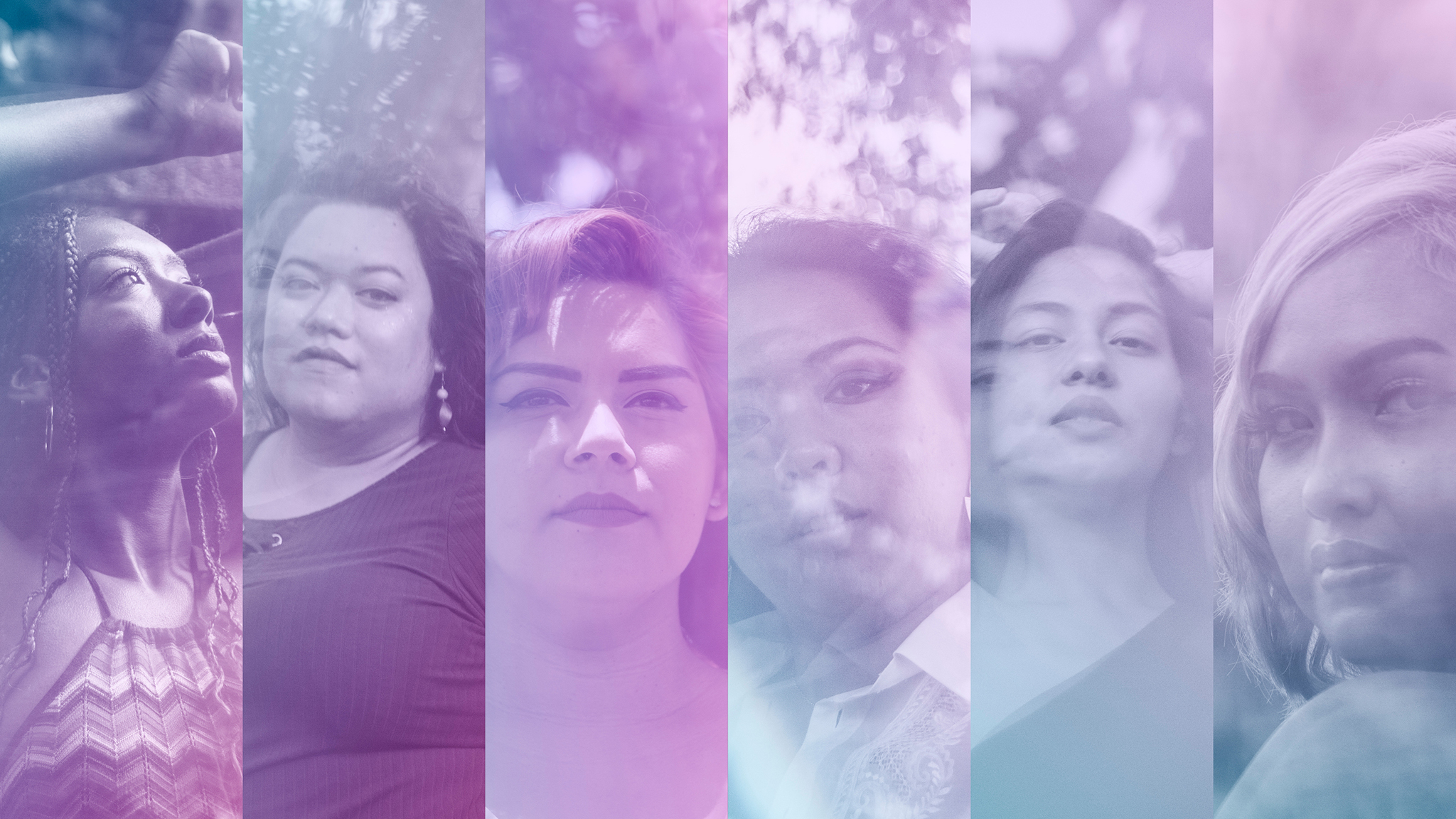Paired with portraiture by Marie Eriel Sagrado Hobro, the bisexual O‘ahu photographer casts a personal and affirming light on a widely misinterpreted community.
Text and images by Marie Eriel Sagrado Hobro
Growing up entrenched in the colonized aspects of Filipino culture, I was conditioned to believe I couldn’t love anyone other than a man. I knew at my core that I’ve always been capable of loving people regardless of gender. Yet with my culture’s heteronormative ideologies weighing on my subconscious, I feared even acknowledging my bisexuality to myself. This internal battle resulted in a lifetime of denying my truth, prohibiting me from ever feeling whole.
As I reflected on these feelings amidst the height of the pandemic, I was able to reach a place of acceptance within myself and come out as a bisexual woman.
This liberating confession allowed me to feel like I could breathe for the first time in 24 years. Yet this sense of euphoria quickly faded as my severe anxiety arose. Despite my siblings, friends, and boyfriend of almost three years easily accepting me, all the biphobic remarks I’ve ever heard flooded my head.
Because of my opposite-sex relationship, I feared that I would be seen as an imposter by the LGBTQ+ community. I feared hearing the responses of my more conservative Filipino relatives. I feared the possibility of breaking my family’s heart. I knew that my romantic history didn’t define my sexuality; disapproval from others didn’t make me any less queer or valid.
Yet, my irrational fears sent me spiraling in self-doubt. My mental health and confidence began to plummet, a stark contrast from the freedom I felt several days before.
It’s been almost a year since coming out. These feelings of trauma and disconnect continue to come in ebbs and flows. Some of my deepest fears have come to fruition, creating a heaviness in my heart as this year’s Pride month begins. As I write this, I know the struggles this article can bring to my life—but I am ready to take the next step towards wholeheartedly loving myself. I hope for the day I can voice who I am out loud without fear and feeling like a con.
This case of imposter syndrome is a common occurrence amongst many bisexual individuals. Many of us are subjected to biphobia enacted by LGBTQ+ and straight individuals, internalized biphobia, unsupportive partners and loved ones, and erasure.
Because of our sexual fluidity, bisexual women have been often seen as less desirable and untrustworthy by individuals within the lesbian community. This often results in romantic rejection, making it difficult to cultivate same-sex relationships. The numbers proving this are staggering. Only 9% of bisexuals are in same-sex relationships, while 84% of bisexuals are in hetereosexual relationships.
According to a study conducted by La Trobe University in Australia, these forms of discrimination cause greater mental health issues for bisexuals in comparison to gay and lesbian individuals. This impacts bisexual adults who identify as women, transgender, and other gender “minorities” the most. Bisexual youth are also more prone to bullying and suicidal thoughts.
Living as a person of color is already strenuous as is. When an individual is discriminated against for both their race and sexual orientation, this can lead to a development of multiple minority stress, ultimately worsening the state of one’s mental and physical health.
The foundation of the LGBTQ+ movement was paved by pioneers like Marsha P. Johnson and Sylvia Rivera, who both identified as bisexual, trans women of color. Brenda Howard, the co-organizer of the Christopher Street Liberation Day March, the first LGBTQ+ Pride march, was also bisexual.
Despite this, we continue to be othered by people even on the LGBTQ+ spectrum. This disregard is blatant in the lack of representation and online resources available for us –– especially for bisexual BIPOC individuals like myself.
To combat this, I decided to create a visual love letter to my community showing bisexual women of color standing in their power.
Beyond the traumas that come with our multifaceted existences, there is so much beauty that lies within our ability to love beyond the binaries of gender. These photographs are representative of this, showing each person glowing amidst the hues and layers of the bisexual flag.
A*
Filipino and white; she/her
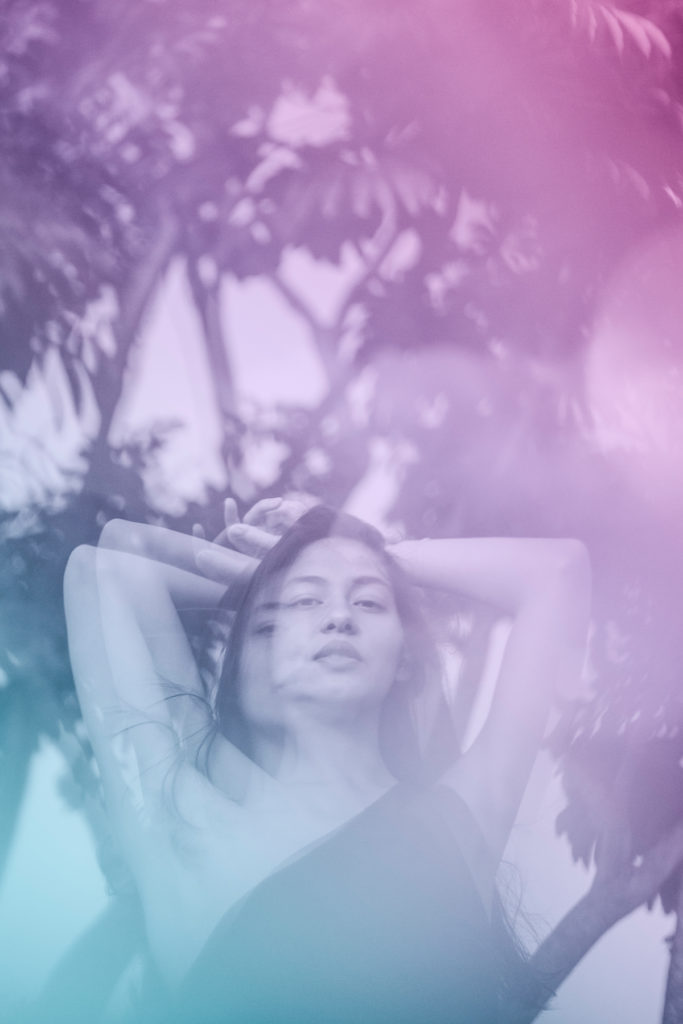
As a biracial, bisexual individual, I feel as though I am straddling between identities. My journey to understanding my identity took time. I didn’t consider myself to be a POC until college because although I am Filipino, I am literally lacking in color.
Due to religious pressure, I always tried to ignore my sexuality until I realized that I couldn’t comprehend what it would be like to be straight. As a bi woman in a relationship with a man, I recognize that it changes the perception that the LGBTQA+ community may hold [of] me. It relates to my feelings about being a white-passing Filipina.
However, to quote Viet Thanh Nguyen, “I am not half of anything, but twice of everything”.
I am still valid, even though parts of identity draw outside the lines. I do not have to prove the facts of my being to anyone.
My advice to other queer POCs is a reminder that being queer isn’t a betrayal of your heritage. This comes from the guilt I once felt, once believing I was betraying the ideals of my religion by [being] queer.
Moving beyond that space took decolonializing my mentality. So embrace the nuances that you are made of, and fight for a freer perception of yourself.
* name shortened for privacy
Katherine Wong
Filipino, Native Hawaiian, Japanese, and Chinese; she/they
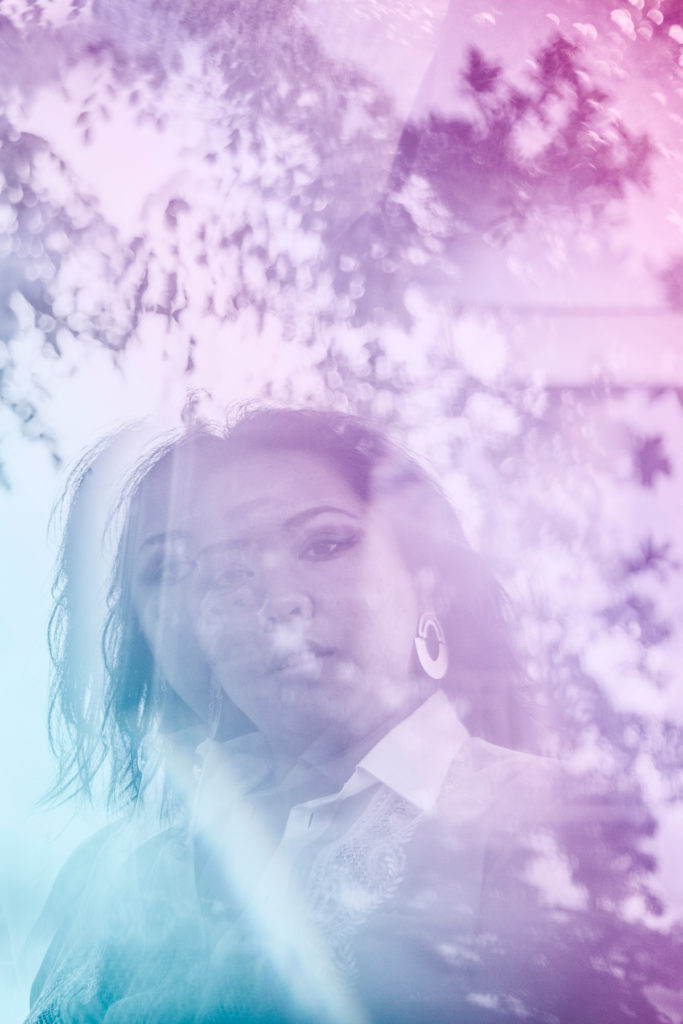
Being bisexual as an Asian and Pacific Islander person, you’re not just coming out for yourself. Your choices are hardly ever your own. [As a] first-generation Filipino-American, you’re already so disconnected. You’re not American enough, but you’re too American for the homeland. It’s like the more levels of otherness you can tack on to yourself, the more difficult it becomes to grow authentically. When it comes to being queer in a conservative Asian space, our individual needs as people aren’t heard. We don’t talk about mental illness. We don’t talk about gay rights. It creates a sense of invisibility, like I’m not worth making people uncomfortable. I think those layers make it exhausting to come out as a queer person of color.
It’s been hard for me to feel accepted within the [LGBTQ+] community because I have the benefit of being straight passing. What I’ve done to combat that [imposter syndrome] is learning more about LGBTQ history.
This has helped me understand that we’ve never been a perfect community and it’s a long road to becoming more united. There’s so much infighting that’s unnecessary. I think normalizing bisexuality and other sexually marginalized groups is necessary to create an effective change amongst queer people.
I’ve heard bisexuals described as greedy and self-serving when it’s the opposite. I think it takes a lot of love in your heart to be able to look at everyone and see potential. Especially looking at Sylvia Rivera and Marsha P. Johnson, [two] iconic trans, bisexual activists. They cared for everyone [and] carried their whole community within them. The piece of advice that I would tell people is don’t let other people define you. The only person who’s experiencing this reality is you and your body at this present time.
Oni Connor
Black, Native Hawaiian, Chinese, and Filipina; she/her
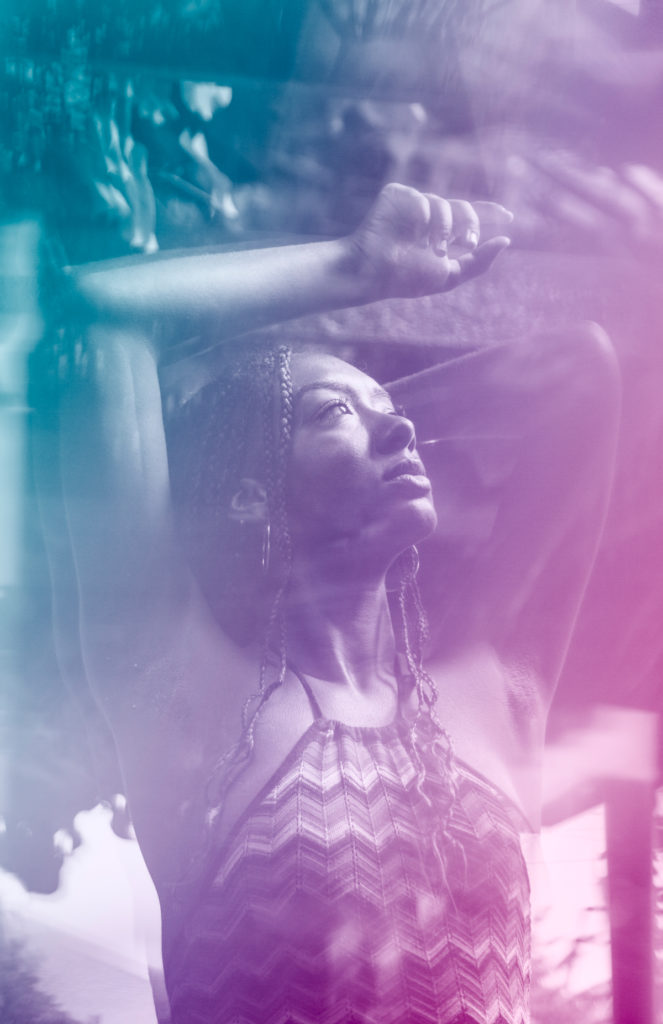
To me, bisexuality is inner freedom. It is the acceptance within myself and the permission to feel how I feel. More than anything else, bisexuality is my safe space. I’m a Black, Hawaiian, Chinese, Filipina, and First Nation woman that is tall, dark-skinned, and proud. My bisexuality simply adds another layer to gawk at. Who I am at my very core is already enough to offend. I won’t apologize for it. I’m okay with not fitting in.
I feel it’s really important to dismantle the stereotype that bisexuality is for those that can’t “pick a side.” It’s okay to not understand something, but this superficial take is so harmful to the community. It’s a daily struggle for me. But reminding myself that I am both safe and loved has been the best remedy thus far.
Andrea Drizos
Mexican; she/her
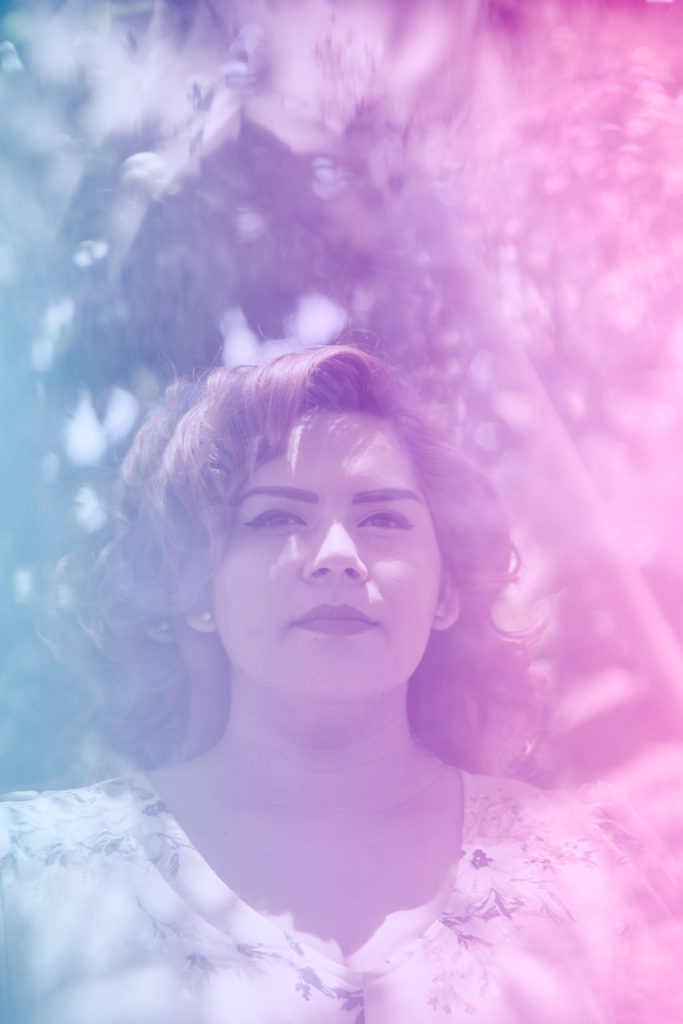
I always fought knowing [I was bisexual]. I feel like I’ve always disregarded it. I’ve known since I was an early teenager. Growing up Hispanic, [there was] the expectation of marriage and kids. I feel we pass down the stereotypes of having kids young in my culture and roles to fulfill. Being anything but straight was quickly dismissed because it seemed like I’d be inviting in doom for my family’s expectations of me. I would even joke around about it [with my parents] and then they’d be like, “No, I need grandbabies.” Just because I’m bisexual doesn’t mean that I don’t want a family. Because it’s so sexualized, it doesn’t feel like it could be a genuine thing. That’s what’s hard.
I haven’t been as open to deal with it as much as I probably should. I only talk about it with my husband. Now that I have him [my son], I gotta be fully open. I don’t want him to feel how I was feeling. I don’t want him to feel trapped inside. I just appreciate being able to come to a point of having the confidence to talk about it. Me and my husband’s friends are pretty much like 95 percent gay or bi or lesbian or trans. When you surround yourself with people that are like you, it feels more validating to be who I am because I see who they are. It makes me feel like I’m in the right place.
Shayna Lonoaea-Alexander
Native Hawaiian, Samoan, Filipino, Black, Chinese, and white; she/they
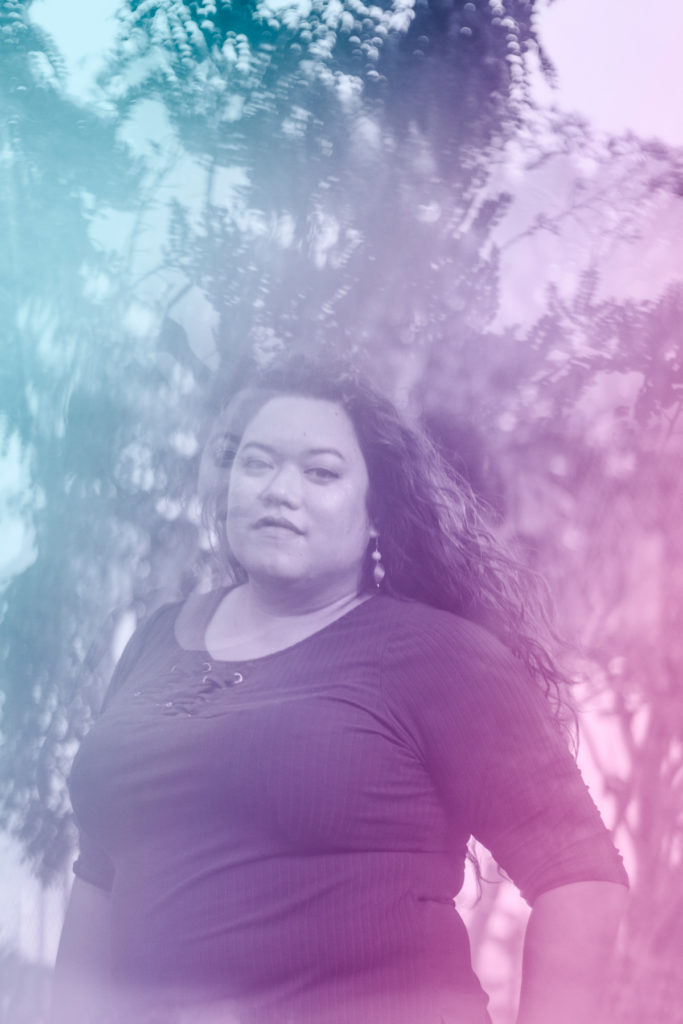
Queerness was pretty normalized growing up since I have a lesbian aunty and gay uncle. Like in a lot [of] Pasifika families, they’re like second parents to me. It wasn’t all roses though. [They] had to navigate a lot of harm, rejection, and trauma from the rest of the family and commit to healing with them.
For years, I dated people across the gender spectrum. But I didn’t feel rooted in my sexuality until I questioned why I felt most safe in queer spaces. I would be intensely adamant [when] I lived in Wyoming about there needing to be Pride events, queer resolutions and legislation.
I came to realize this work wasn’t just for my gay best friend, my lesbian aunty, queer rural kids, or for our BIPOC trans foremothers. It was for me, too. I had to do so much to find love for myself that I’m not unwilling to let anyone, even myself, undo it.
Despite the daily feedback and vitriol we see online or experience at home, work or church, there are so many people who love us. We are worthy and deserve that love and more.
I think about how my body is fat, cis, queer, and hapa. If I was truly deemed worthy by everyone in Hawai‘i, people who look like me wouldn’t face houselessness, domestic violence, food insecurity, survival sex work, incarceration, lack of access to proper medical care, and poverty to such a great extent—44 percent of lesbians and 61 percent of bisexual women experience rape, physical violence, or stalking by an intimate partner, compared to 35 percent of straight women.
If we face so much violence and shame from people who should love us the most, I wonder if this contributes to the lack of bisexual visibility. Being out is personal and political; it comes with consequences. White queer folks can definitely face these barriers to healing and justice, but [queer BIPOC] get left out when solutions are brought to the table.
Jessyka Quisquino
Filipino; she/her
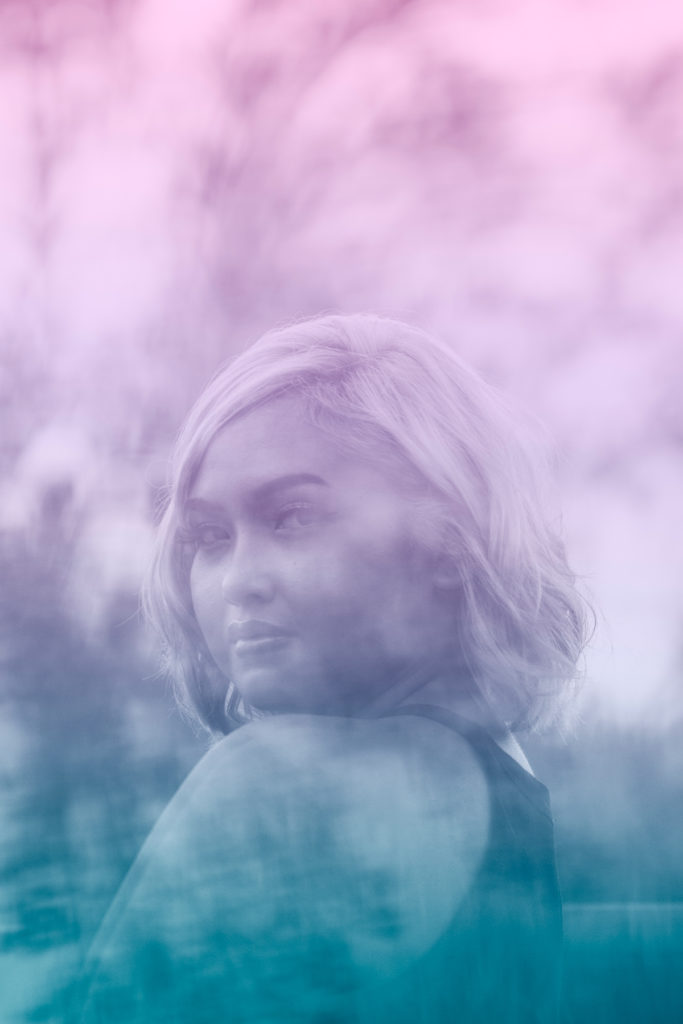
As I get older, I can wholeheartedly see myself spending my life with either [a] man or woman. [What helped me was] the support from my best friend and my cousin who had recently come out as bisexual. They validated and supported my feelings. Since then, the confusion and fear [has] slowly went away.
Coming from a conservative Filipino family, I feel like I have to be very careful as to who I open up to and how I do it. I fear that it can be very dangerous. When another cousin first came out [as gay], things got heated and they [my family] got verbally aggressive. If I marry a man, my family will think I got over my “phase.”
If I marry a woman, my family will think I was a closeted lesbian. A lot of older people can’t wrap their heads around the openness about bisexuality. They don’t understand that you can equally love both.

